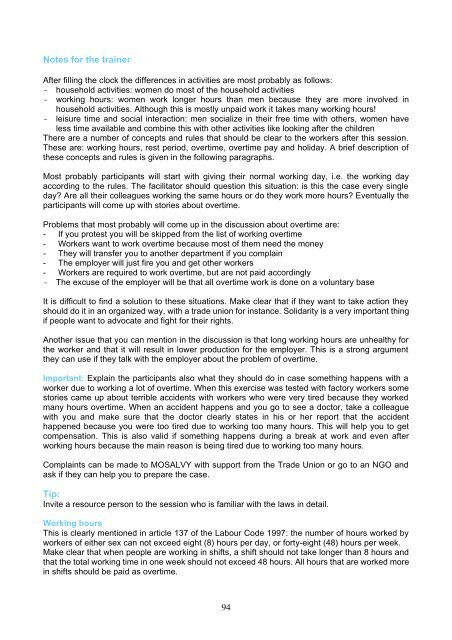manual: women workers' rights and gender equality - International ...
manual: women workers' rights and gender equality - International ...
manual: women workers' rights and gender equality - International ...
Create successful ePaper yourself
Turn your PDF publications into a flip-book with our unique Google optimized e-Paper software.
Notes for the trainer<br />
After filling the clock the differences in activities are most probably as follows:<br />
- household activities: <strong>women</strong> do most of the household activities<br />
- working hours: <strong>women</strong> work longer hours than men because they are more involved in<br />
household activities. Although this is mostly unpaid work it takes many working hours!<br />
- leisure time <strong>and</strong> social interaction: men socialize in their free time with others, <strong>women</strong> have<br />
less time available <strong>and</strong> combine this with other activities like looking after the children<br />
There are a number of concepts <strong>and</strong> rules that should be clear to the workers after this session.<br />
These are: working hours, rest period, overtime, overtime pay <strong>and</strong> holiday. A brief description of<br />
these concepts <strong>and</strong> rules is given in the following paragraphs.<br />
Most probably participants will start with giving their normal working day, i.e. the working day<br />
according to the rules. The facilitator should question this situation: is this the case every single<br />
day? Are all their colleagues working the same hours or do they work more hours? Eventually the<br />
participants will come up with stories about overtime.<br />
Problems that most probably will come up in the discussion about overtime are:<br />
- If you protest you will be skipped from the list of working overtime<br />
- Workers want to work overtime because most of them need the money<br />
- They will transfer you to another department if you complain<br />
- The employer will just fire you <strong>and</strong> get other workers<br />
- Workers are required to work overtime, but are not paid accordingly<br />
- The excuse of the employer will be that all overtime work is done on a voluntary base<br />
It is difficult to find a solution to these situations. Make clear that if they want to take action they<br />
should do it in an organized way, with a trade union for instance. Solidarity is a very important thing<br />
if people want to advocate <strong>and</strong> fight for their <strong>rights</strong>.<br />
Another issue that you can mention in the discussion is that long working hours are unhealthy for<br />
the worker <strong>and</strong> that it will result in lower production for the employer. This is a strong argument<br />
they can use if they talk with the employer about the problem of overtime.<br />
Important: Explain the participants also what they should do in case something happens with a<br />
worker due to working a lot of overtime. When this exercise was tested with factory workers some<br />
stories came up about terrible accidents with workers who were very tired because they worked<br />
many hours overtime. When an accident happens <strong>and</strong> you go to see a doctor, take a colleague<br />
with you <strong>and</strong> make sure that the doctor clearly states in his or her report that the accident<br />
happened because you were too tired due to working too many hours. This will help you to get<br />
compensation. This is also valid if something happens during a break at work <strong>and</strong> even after<br />
working hours because the main reason is being tired due to working too many hours.<br />
Complaints can be made to MOSALVY with support from the Trade Union or go to an NGO <strong>and</strong><br />
ask if they can help you to prepare the case.<br />
Tip:<br />
Invite a resource person to the session who is familiar with the laws in detail.<br />
Working hours<br />
This is clearly mentioned in article 137 of the Labour Code 1997: the number of hours worked by<br />
workers of either sex can not exceed eight (8) hours per day, or forty-eight (48) hours per week.<br />
Make clear that when people are working in shifts, a shift should not take longer than 8 hours <strong>and</strong><br />
that the total working time in one week should not exceed 48 hours. All hours that are worked more<br />
in shifts should be paid as overtime.<br />
94

















